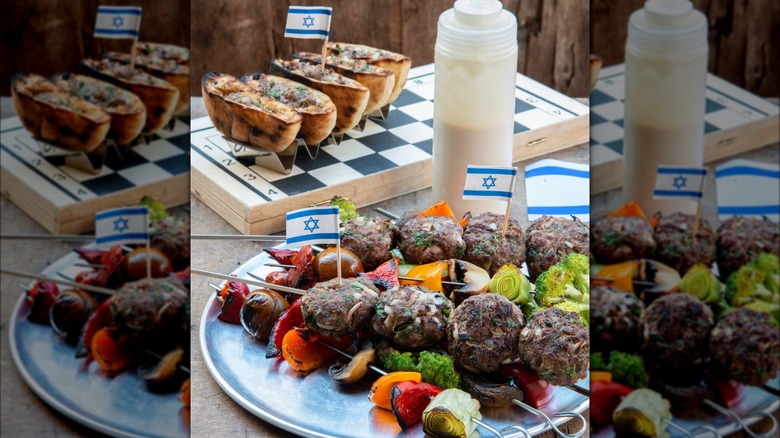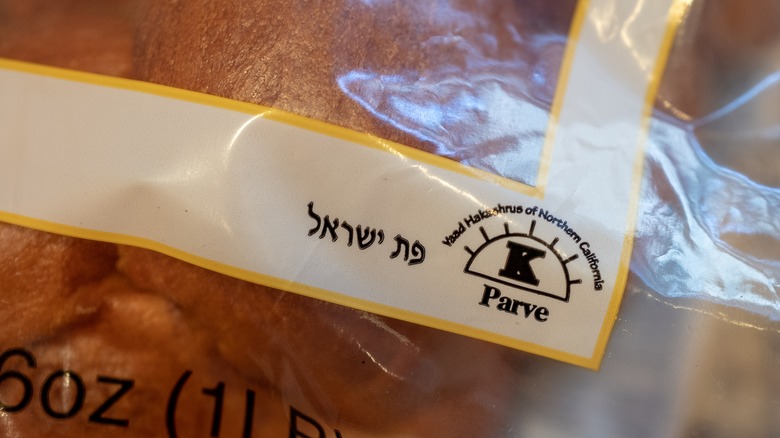What's Jewish Barbecue And Is It Kosher?
Jewish barbecue is bigger than you may have imagined, with dedicated restaurants and cooking competitions now pushing its limits into mainstream barbecue territory. While the exact Kosher rules being followed depend on the pitmaster's choice of cuts and cooking technique, fully Kosher-certified Jewish barbecue can be found if you look for it. Dig deeper, and you'll find that Jewish barbecue has actually earned a place for itself in the larger barbecue scene, taking inspiration not just from Southern classics but even the likes of Korean and Middle Eastern barbecue.
There are challenges, not the least of which is the absence of pork on the menu. However, Jewish barbecue circumvents this by creatively using Kosher cuts of lamb, chicken, and beef, and you'll even find the odd non-pork bacon in the mix. Moreover, it's not just about finding substitutes for regular barbecue fare. Pitmasters firing up Jewish barbecues are more focused on the essence of the cooking style — meat, fire, and patience, and the results are invariably delicious. If you're in doubt, consider a beautifully charred brisket, the Hanukkah staple that's Kosher and relies on slow cooking to turn a particularly tough cut of meat succulent.
Jewish barbecue takes inspiration from all the right places
Jewish barbecue follows most of the cooking techniques used in regular barbecuing and you'll find many similarities on both menus as well. However, staples like pulled pork and ribs are absent, as are dishes that use shellfish. The high heat of an open fire is one of the most important aspects of a good barbecue, and what separates a professional barbecue from a homemade one. As a result, you're likely to have a tastier experience at a Jewish barbecue restaurant than if you try to make it at home. However, this shouldn't stop you from making homemade brisket in the oven.
In addition to taking cues from Southern barbecue, several Jewish barbecue restaurants take inspiration from Tex-Mex, South American, and Asian barbecue. Not having to conform to traditional flavor combinations also gives chefs more freedom to experiment with Jewish barbecue, and you will often find their menus to be more dynamic, not just offering versions of brisket and pastrami.
Another important influence is Middle Eastern and Israeli cuisine, which brings the flavors of cumin, turmeric, sumac, and other exotic spices into the mix. Considering several traditional Israeli dishes are cooked barbecue-style, there's a lot of input from there that's used in Jewish barbecue as well. In addition to cooking ingredients, condiments and sides like za'atar, tahini, and hummus also add a new dimension to the fare.
How Kosher rules affect Jewish barbecue
Kosher dietary guidelines go deeper than just avoiding certain foods. They constitute a complex ethos based on culture and religious beliefs, which has evolved over centuries with changing culinary and dietary landscapes. Therefore, Kosher rules that are adhered to differ amongst followers, and the same goes for Jewish barbecues. While some pitmasters only take dietary restrictions like avoiding pork into account, others pay heed to cooking practices like not mixing dairy and meat.
100% Kosher-certified barbecue is also available in several cities, but it could end up costing more than what you're used to paying. This is mostly because Kosher meat is generally more expensive. However, there are also other factors that make barbecuing Kosher meat more complex. For one, all Kosher meat comes salted because of a process to remove as much blood from it as possible. This means any dry rubs used on the meat need to be adjusted for salt. Some cuts are so salty that chefs modify their barbecuing strategy to balance the flavors.
Kosher barbecue restaurants also cannot use non-Kosher meats, or at least require separate cooking equipment for Kosher and non-Kosher. Therefore, most certified Kosher Jewish barbecue eateries will have a completely Kosher menu. These restaurants have to get creative with ingredients and take advantage of all the unexpected Kosher foods out there, a good example being Coca-Cola, which is often used as a marinade for its flavoring and meat-tenderizing properties.


